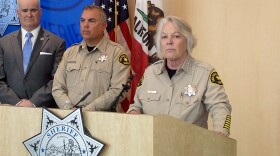A majority of Americans worry this year’s general election will be tainted by fraud, according to a new NPR/PBS News/Marist poll out Thursday — an ominous finding for the thousands of local election officials across the country tasked with administering voting.
Almost 6-in-10 Americans say they’re concerned or very concerned that there will be voter fraud this election, a number that experts say is driven in large part by Donald Trump’s continued false insistence that elections can’t be trusted. Eighty-eight percent of voters who say they support the former president say they are concerned there will be fraud, compared with 29% of those who support the Democratic nominee, Kamala Harris.
In the four years since the 2020 election, there has never been any evidence of widespread voter fraud in that contest, and numerous audits, studies and investigations (including those led by Republicans) have confirmed the results many times over.
Still, as voting has begun in many parts of the country, election officials are struggling to persuade voters listening to political figures who insist the results will be tainted.
Loading...
Local election officials say they’ve spent countless hours trying to educate voters on the checks and balances that make fraud unlikely and rare, but it’s unclear those efforts have made much of a dent. And they worry the stage is set for Trump again to try to overturn the results, or for his followers to commit violence, if they feel the election was stolen from him.
“This conversation is so much deeper than even the mechanics of election administration,” said Stephen Richer, the Republican county recorder in Maricopa County, Ariz. “It’s more about, how do you convince someone of the truth?”
Richer, who lost a reelection bid earlier this year to a GOP challenger, has continuously pushed back against baseless fraud claims since he took office after Trump’s loss in 2020. And he’s talked openly about the threats he’s received, including from a number of men who have been charged for threatening to kill him.
In an interview with NPR last month, Richer said the specific voting conspiracy theory that has “spiked” in recent months is about non-U.S. citizens illegally voting and influencing results.
The new NPR/PBS News/Marist poll confirmed that trend, with 52% of respondents saying they were concerned noncitizens would vote for president in this year’s election, even though that is illegal, and there has never been evidence to support the idea that noncitizens register and vote in anything but microscopic numbers.
NPR reported in the spring that far-right figures — including Trump, X owner Elon Musk and conservative attorney Cleta Mitchell — were beginning to center their voting messaging around noncitizens ahead of the presidential election. The new survey found that 85% of Trump supporters said they were concerned about noncitizen voting.
Ninety percent of Trump supporters also think all immigrants who came into the country illegally should be deported.
The mass deportation idea, a draconian step favored by Trump, is now mainstream, with 59% of voters agreeing with the idea.
Marist interviewed 1,628 adults for the survey, which was conducted Friday through Tuesday. The overall poll sample has a margin of error of +/- 3.3 percentage points, with larger margins of error for subgroups.
Trust is higher in a voter’s local elections
It’s long been a truism in elections that voters have much less trust in elections in other places, but have more faith in the voting system where they live. The new poll results bear that out as well.
Close to 80% of voters surveyed said they were confident that their state or local government would run a fair and accurate election this November.
Tina Barton, a Republican former election official from Rochester Hills, Mich., told NPR that the most effective way to build confidence in elections is to keep reminding people that voting is a local activity and election officials are human beings in their community as well.
“These are people who live and work in your neighborhood, go to the same church you do, your kids play soccer together,” Barton said. “This is still a neighborhood transaction.”
Another partisan divide likely in voting methods
The poll also provided more insight into how people plan to cast ballots this year, with the long-term trend of more and more early voting seeming poised to continue.
Roughly half of registered voters said they planned to vote early, either in-person at a polling place or by mail, and half said they planned to vote in-person on Election Day.
Loading...
Some partisan differences in those methods still exist, after Trump’s efforts in 2020 to demonize absentee voting during the pandemic. About 71% of likely voters who say they plan to vote by mail support Harris, while 58% of planned Election Day voters say they back Trump.
Harris holds a slim lead over Trump
The presidential race continues to be a toss-up.
Among likely voters — which Marist describes as voters who say they are definitely voting this year — Harris holds a slim lead over Trump, 50% to 48%. That lines up with the previous NPR/PBS News/Marist survey, in September, and national polling averages.
Trump holds a narrow, 4-point edge with independents, and the survey points to a vast gender gap: Trump leads Harris by 16 percentage points with men, while Harris outpaces Trump with women by 18 points.
Copyright 2024 NPR








